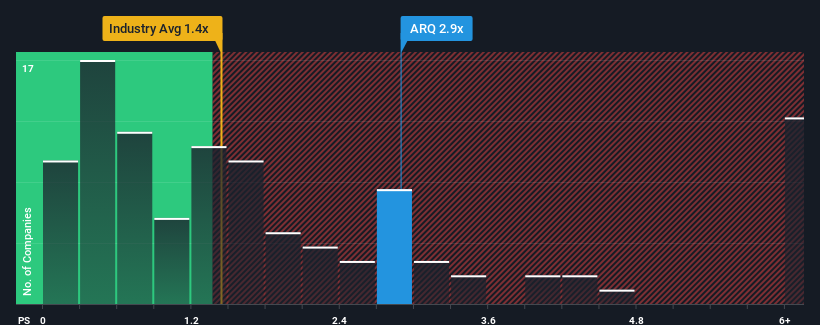- United States
- /
- Chemicals
- /
- NasdaqGM:ARQ
Arq, Inc.'s (NASDAQ:ARQ) 30% Jump Shows Its Popularity With Investors
Arq, Inc. (NASDAQ:ARQ) shares have had a really impressive month, gaining 30% after a shaky period beforehand. The last month tops off a massive increase of 179% in the last year.
After such a large jump in price, when almost half of the companies in the United States' Chemicals industry have price-to-sales ratios (or "P/S") below 1.4x, you may consider Arq as a stock probably not worth researching with its 2.9x P/S ratio. Nonetheless, we'd need to dig a little deeper to determine if there is a rational basis for the elevated P/S.
Check out our latest analysis for Arq

What Does Arq's P/S Mean For Shareholders?
Recent times have been pleasing for Arq as its revenue has risen in spite of the industry's average revenue going into reverse. The P/S ratio is probably high because investors think the company will continue to navigate the broader industry headwinds better than most. However, if this isn't the case, investors might get caught out paying too much for the stock.
Keen to find out how analysts think Arq's future stacks up against the industry? In that case, our free report is a great place to start.Do Revenue Forecasts Match The High P/S Ratio?
The only time you'd be truly comfortable seeing a P/S as high as Arq's is when the company's growth is on track to outshine the industry.
Retrospectively, the last year delivered an exceptional 16% gain to the company's top line. Although, its longer-term performance hasn't been as strong with three-year revenue growth being relatively non-existent overall. Therefore, it's fair to say that revenue growth has been inconsistent recently for the company.
Shifting to the future, estimates from the three analysts covering the company suggest revenue should grow by 20% each year over the next three years. Meanwhile, the rest of the industry is forecast to only expand by 6.1% per annum, which is noticeably less attractive.
With this information, we can see why Arq is trading at such a high P/S compared to the industry. It seems most investors are expecting this strong future growth and are willing to pay more for the stock.
What We Can Learn From Arq's P/S?
The large bounce in Arq's shares has lifted the company's P/S handsomely. Generally, our preference is to limit the use of the price-to-sales ratio to establishing what the market thinks about the overall health of a company.
As we suspected, our examination of Arq's analyst forecasts revealed that its superior revenue outlook is contributing to its high P/S. Right now shareholders are comfortable with the P/S as they are quite confident future revenues aren't under threat. It's hard to see the share price falling strongly in the near future under these circumstances.
Before you take the next step, you should know about the 3 warning signs for Arq (1 is a bit concerning!) that we have uncovered.
If these risks are making you reconsider your opinion on Arq, explore our interactive list of high quality stocks to get an idea of what else is out there.
New: Manage All Your Stock Portfolios in One Place
We've created the ultimate portfolio companion for stock investors, and it's free.
• Connect an unlimited number of Portfolios and see your total in one currency
• Be alerted to new Warning Signs or Risks via email or mobile
• Track the Fair Value of your stocks
Have feedback on this article? Concerned about the content? Get in touch with us directly. Alternatively, email editorial-team (at) simplywallst.com.
This article by Simply Wall St is general in nature. We provide commentary based on historical data and analyst forecasts only using an unbiased methodology and our articles are not intended to be financial advice. It does not constitute a recommendation to buy or sell any stock, and does not take account of your objectives, or your financial situation. We aim to bring you long-term focused analysis driven by fundamental data. Note that our analysis may not factor in the latest price-sensitive company announcements or qualitative material. Simply Wall St has no position in any stocks mentioned.
About NasdaqGM:ARQ
Arq
An environmental technology company, engages in the sale of consumable air, water, and soil treatment solutions based on activated carbon in the United States and Canada.
Reasonable growth potential with mediocre balance sheet.
Similar Companies
Market Insights
Community Narratives




